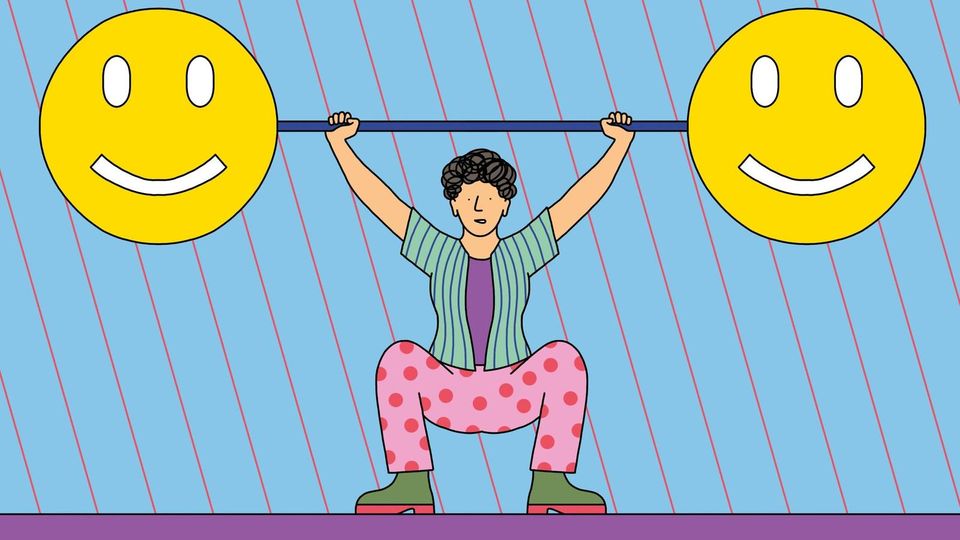Though my professional titles have long been Certified Strength & Conditioning Specialist and National Board Certified Health & Wellness Coach (what a mouthful!), I’ve long thought of myself as a Health & Happiness Coach.
I’m less interested in helping people build a physical monument to themselves (or their egos) than I am in helping them be happier, more confident and more self-fulfilled. I try to get people to focus less on the amount of fat or muscle on their bodies and more on reducing stress, improving self-esteem, sleeping better, lowering blood pressure and resting heart rate, developing better mobility and balance, and building stronger bones, ligaments and tendons, as well as muscles.
A single workout increases neurotransmitters like dopamine, serotonin and noradrenaline, and these mood boosters can also improve your memory and focus for up to three hours afterwards. Research shows that exercise even lowers anxiety levels, and it does it rather quickly — in about 10 minutes. So, exercise helps your mental health, as well as your cognition. Even a brisk walk can help boost your neurotransmitters and mood.
Scientists at Duke University Medical Center tested three groups with depression. One was prescribed exercise; one was prescribed Zoloft; and the third was prescribed a combination of the two. Remarkably, the group that just exercised had the best results. And exercise seemed to do a better job of keeping the depression symptoms from coming back.
Indeed, exercise has a multitude of positive effects; it even helps your brain grow new neurons. During a process called neurogenesis, new neurons (brain cells) develop in the hippocampus, the brain region responsible for learning information, storing long-term memories, and regulating emotions.
Exercise also promotes brain plasticity by stimulating growth of new connections between cells in many important cortical areas of the brain.
Yes, exercise even leads to a happier, healthier brain!
The physical, emotional and mental benefits of exercise are numerous. So, there are bountiful reasons make regular exercise part of your weekly or even daily life.
Yet, our wellbeing can be affected by more than just exercise.
For example, there is a vital connection between the brain and the gut, where 90% of our serotonin receptors are located. The truth is, the foods we eat not only affect our physical health, but also our emotional wellbeing.
Ultra-processed foods and foods that contain chemical additives negatively affect our gut health and increases our risk of illness. Ultra-processed foods, such as fast foods, are typically cheap, and they’re scientifically designed to be extra tasty and make you overeat. Even worse, ultra-processed foods are known cause inflammation and disease.
On the other hand, a recent study found that fiber might be linked with a reduced risk of depression, especially in pre-menopausal women. Previous studies had already suggested the benefits of fiber for mental health. The link between dietary fiber and depression may be partially explained by gut-brain interactions, since fiber improves the richness and diversity of gut microbiota. It’s theorized that changes in gut-microbiota composition may affect neurotransmission.
Additionally, according to the Cleveland Clinic, protein consumption (from foods like fish, beef, chicken, turkey, tofu, beans, eggs and unsweetened yogurt) has been linked to higher levels of dopamine and norepinephrine, the brain chemicals that play a role in your mood, motivation and concentration.
So, our diets can indeed affect our mood state and mental wellbeing, as well as our physical wellbeing.
Finding healthy ways to manage our stress is also very important. The stress hormone cortisol is known to interfere with immune functioning and even the workings of the cardiovascular system. In fact, stress is an underrated, yet profound, factor in the development of cardiovascular disease. Stress exacerbates cholesterol levels, raises blood pressure and heart rate, and it often creates the kind of pressure that prevents a person from engaging in enough healthy self-care activities.
So, it’s important to find healthy ways to mitigate and manage stress. Lowering your stress levels with relaxation techniques, such as meditation, can reduce your risk of health problems.
However, people often turn to unhealthy coping mechanisms, such as food, alcohol, drugs and impulsive shopping to cope with life’s stresses. Yet, these things ultimately make our stresses even worse in the long run. Meditation, on the other hand, can be helpful in managing stress and anxiety, as well as a variety of other health conditions. Research studies have shown that regular meditation can actually change the physical structure and cognitive function of the brain.
Ultimately, true wellness requires a comprehensive, holistic approach, where all of these factors are considered and implemented.
It may seem intuitive or self-evident that being unhealthy could make someone unhappy, and there’s evidence to support that notion. A study at George Mason University found that the degree to which a disease disrupts daily functioning is associated with reduced happiness. According to the lead author of the study, “these results support the notion that health status is one of the most important predictors of happiness.”
A study of the “Economic Determinants of Happiness,” based on data gathered by the U.S. Census, revealed that health is a far more powerful determinant of an individual’s happiness than his or her income, marital status, age or any other factor. In fact, self-described “healthy” people are 20 percent happier than average, while “unhealthy” people are 8.25 percent less happy.
Okay, but how about the inverse? Can being happy make you more healthy?
According to researchers at Southern Methodist University, there is plenty of evidence to suggest that people’s overall sense of life satisfaction and typical levels of happiness are linked to physical health.
And, according to Harvard Medical School, scientific evidence suggests that positive emotions can help make life longer and healthier.
Furthermore, according to Northwestern Medicine, happiness lowers your risk for cardiovascular disease, lowers your blood pressure, enables better sleep, improves your diet, allows you to maintain a normal body weight through regular exercise and reduces stress.
Clearly, happiness and health are interrelated. And most research suggests that the connection between happiness and health is bidirectional. This means that greater wellbeing leads to better physical health, and better physical health leads to greater wellbeing. One thing leads to the other.
This is why I have always taken a “whole-being” approach to health and wellness. We can’t simply focus on having a little less body fat, bigger biceps or a better butt and expect to be necessarily healthier and/or happier. Certainly, seeing improvements in your physique can be positive and uplifting. But adequate sleep, good nutrition and stress reduction are also vital to our overall wellbeing.
Seeing verifiable improvements in your biomarkers (i.e., blood pressure, resting heart rate, LDL cholesterol, etc.) is not only a clear indication of improving physical health, it also gives you a big boost emotionally and mentally — even if your biceps don’t get any bigger or your butt doesn’t necessarily look better.
Ultimately, exercise, a nutritious diet, meditation, and other forms of self-care can make us healthier, happier, and mentally sharper, all of which are very worthwhile pursuits.
If you’d like help in forging a healthier lifestyle, please reach out to me. It could very well make you happier, too!






